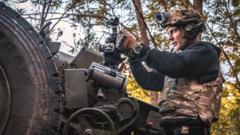Amidst a visit to the front lines on Thursday, General Syrskyi confirmed that Ukrainian troops have managed to stabilize the combat situation in the Sumy region, effectively choking off the Russian summer offensive that had been threatening to gain ground. Despite these reports of success, he acknowledged significant gaps in fortifications that could jeopardize their strategic advantage.
Commenting on the situation, he emphasized the urgent need for additional fortifications, stating, "Establishing 'kill zones', constructing anti-drone corridors, and enhancing logistics are critical tasks that we are addressing." However, Syrskyi admitted that existing improvements must be expedited and optimized, as delays in fortification construction could leave vulnerable sections of the front line exposed.
The geopolitical background surrounding the conflict remains complex. The Sumy region, which borders Russia’s Kursk region, has seen fluctuating warfare dynamics, notably due to past incursions by Ukrainian forces into Russian territory which aimed to disrupt Russian military corridors. The ownership of these regions has been hotly contested, as Russia has claimed parts of Sumy after significant assaults.
Recent criticisms from military analysts, including those from DeepState, underline the reality on the ground: combat persists in unfortified areas, raising alarms over inadequate defensive structures capable of withstanding Russian missile strikes. High civilian casualties have resulted from these attacks, with one particularly deadly missile strike on April 13 claiming at least 34 lives.
Russian President Vladimir Putin noted intentions to establish buffer zones along the border, a strategy likely fueled by the positioning of around 50,000 Russian troops in the area. Despite these developments, there have been ongoing discussions regarding European and Canadian support for Ukraine, with recent pledges totaling approximately €35 billion to bolster defenses.
As the war rolls into its fourth year, pressure mounts on Ukraine's leadership to safeguard their sovereignty amidst fluctuating international support and aggressive military maneuvers from Russia, which continues to target Ukrainian cities with drone strikes and missile attacks.
Commenting on the situation, he emphasized the urgent need for additional fortifications, stating, "Establishing 'kill zones', constructing anti-drone corridors, and enhancing logistics are critical tasks that we are addressing." However, Syrskyi admitted that existing improvements must be expedited and optimized, as delays in fortification construction could leave vulnerable sections of the front line exposed.
The geopolitical background surrounding the conflict remains complex. The Sumy region, which borders Russia’s Kursk region, has seen fluctuating warfare dynamics, notably due to past incursions by Ukrainian forces into Russian territory which aimed to disrupt Russian military corridors. The ownership of these regions has been hotly contested, as Russia has claimed parts of Sumy after significant assaults.
Recent criticisms from military analysts, including those from DeepState, underline the reality on the ground: combat persists in unfortified areas, raising alarms over inadequate defensive structures capable of withstanding Russian missile strikes. High civilian casualties have resulted from these attacks, with one particularly deadly missile strike on April 13 claiming at least 34 lives.
Russian President Vladimir Putin noted intentions to establish buffer zones along the border, a strategy likely fueled by the positioning of around 50,000 Russian troops in the area. Despite these developments, there have been ongoing discussions regarding European and Canadian support for Ukraine, with recent pledges totaling approximately €35 billion to bolster defenses.
As the war rolls into its fourth year, pressure mounts on Ukraine's leadership to safeguard their sovereignty amidst fluctuating international support and aggressive military maneuvers from Russia, which continues to target Ukrainian cities with drone strikes and missile attacks.




















